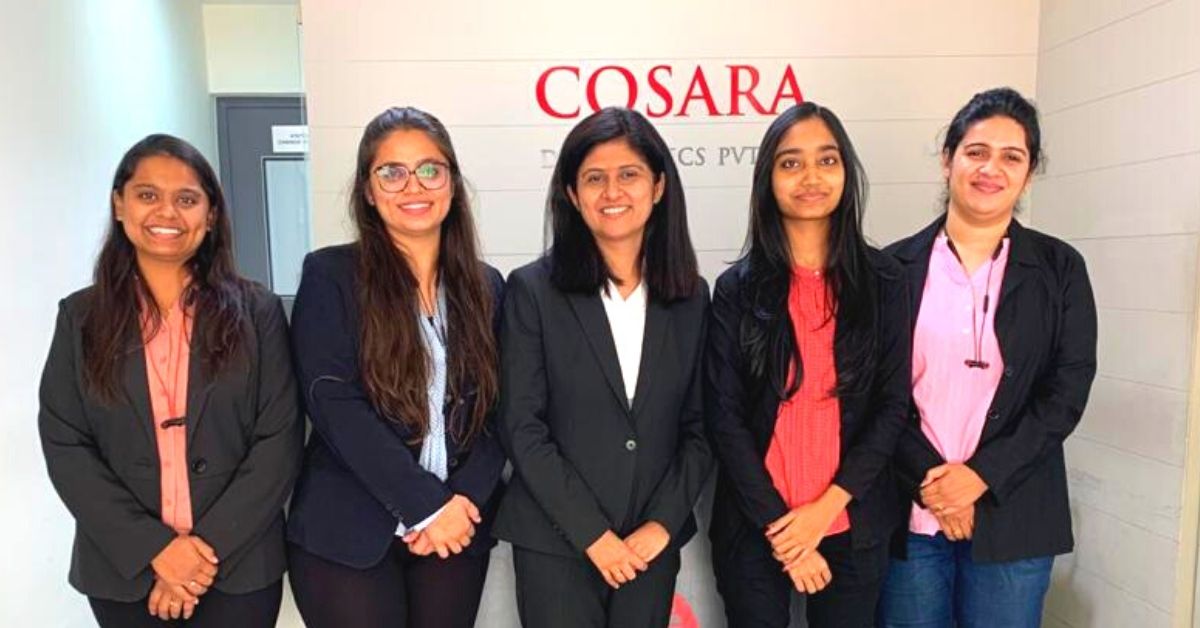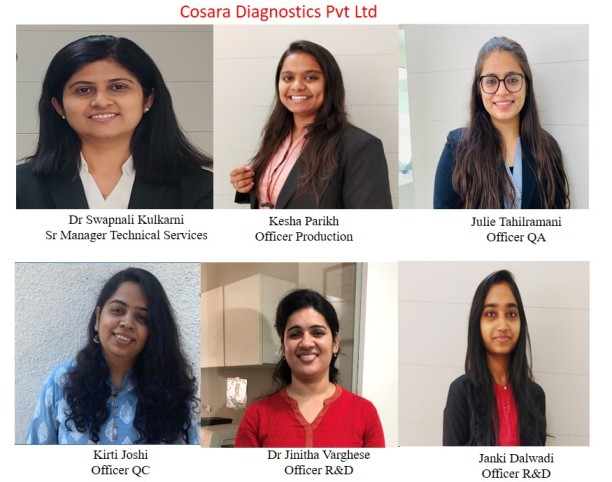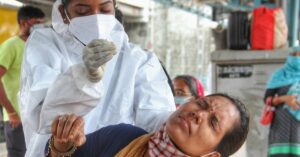COVID-19: Meet The 6 Women Who Made 20 Lakh RT-PCR Kits For India In A Year
Vadodara-based Cosara, helmed by six women, has been making RT-PCR tests amid the COVID-19 pandemic since April 2020, to ensure timely detection of the disease.

On April 26, Delhi woke up to a dip in coronavirus cases, as the single-day spike stood at 20,201. While many saw this as a sign of relief, it was later noted that the city had conducted fewer tests on Sunday (April 25). From a daily average of 79,123, the tests came down by 37%. A similar trend was also seen in Maharashtra, thus reiterating the significance of COVID-19 tests before premature celebrations on such developments.
It is no doubt that hospitals and COVID-19 centres are swamped, as across India, people showing symptoms are rushing to get tests conducted. A colleague in Gurugram had to wait for nearly a week to get the test, and by the time her number came, her symptoms were gone.
Conducting tests on time has been a crucial component in this fight against the deadly virus, but very few know what goes behind making thousands of kits without delays. A delay by even an hour can cost someone their life, as hospitals are now not admitting patients without the test results.
The Better India spoke to Vadodara-based Dr Swapnali Kulkarni, who is at the forefront of making Reverse transcription-polymerase chain reaction (RT-PCR) kits. An average of 40,000 tests are dispatched every day from Cosara Diagnostics Pvt Ltd, where Dr Kulkarni heads the technical services department.
Along with her, five other women — production officer Kesha Parikh, quality assurance officer Julie Tahilramani, R&D officers Janki Dalwadi and Jinitha Varghese, and quality check officer Kirti Doshi — are heading the operations of diagnostic tests to meet the country’s massive demand.

Dr Kulkarni talks about what goes on inside the factory, the race between quality checks and time, and why the women-led team has not taken a single leave in the last year.
20 lakh kits for India
Cosara is a subsidiary of the listed company Ambalal Sarabhai, founded by Vikram Sarabhai. It has been a pioneering supplier of RT-PCR to various states including Gujarat, Telangana, Maharashtra, Karnataka and Delhi. Since the beginning of lockdown in April 2020, it has supplied nearly 20,00,000 tests.
When they started, the daily manufacturing capacity was 8,000, which has increased by 400% in the second wave. The pressure to fill the demand and supply gap is immense, notes Dr Kulkarni.
“Earlier, we were making tests on a per person basis, but now, we have to make kits. Each kit comprises 400-500 tests. We are way past adhering to our office timings, and each person is dedicating extra hours without complaining. Not a single person has applied for leave even though the option is available. This is the time when we are given a chance to put our education and knowledge to use. Everyone wants to contribute in tackling the crisis and that is commendable.”
The staff’s dedication is reflected in the modified working pattern. Contrary to the previous system, where each department was doing its designated work, the work is now overlapping. For instance, if a person in charge of packaging finishes work early, they immediately rush to check if the tally department needs a hand.
There are multiple stages of test preparation that take place over two days, including pre and post-production. The technology, developed by Cosara, is faster and gives the results in real-time.
“Traditional protein-based diagnostic tests need a particular period after infection for correct diagnosis. As early diagnosis is the basis to define the line of treatment, it becomes very crucial for doctors to choose a reliable diagnostic test that detects the presence of any pathogen as early as possible after entering the human body, and before it shows symptomatic manifestation. Our kits are based on the Real-Time PCR (RT PCR) technique, which is the latest technology in the diagnostic field. This technique skips the wait for a lengthy window period,” Dr Kulkarni explains.
The kits are developed using Co-Primer Technology, which enhances speed, accuracy and cost-effectiveness. It is a combination of biotechnology, advanced algorithms, and bioinformatics. Tests can be performed in less than three hours from DNA extraction. Once the kits are ready, they go through randomised checking and other quality checks before dispatch.
Apart from helming the process, the team also assists government and private labs with technical guidance. Seeing the current rate at which cases are spiking, the team aims to scale its operations and make 8,00,000 tests every month shortly.
Edited by Divya Sethu
If you found our stories insightful, informative, or even just enjoyable, we invite you to consider making a voluntary payment to support the work we do at The Better India. Your contribution helps us continue producing quality content that educates, inspires, and drives positive change.
Choose one of the payment options below for your contribution-
By paying for the stories you value, you directly contribute to sustaining our efforts focused on making a difference in the world. Together, let's ensure that impactful stories continue to be told and shared, enriching lives and communities alike.
Thank you for your support. Here are some frequently asked questions you might find helpful to know why you are contributing?


This story made me
-
97
-
121
-
89
-
167














